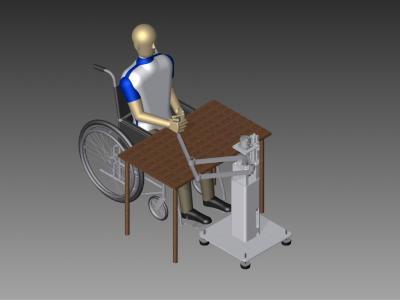Daily tasks
The second robot developed by the Biomedical Neuroengineering Group is Robotherapist 3D, whose worldwide patent has been granted to Instead Technologies. This new machine helps patients to perform movements in all positions and directions. In addition, it has a virtual reality system so that people can start to carry out everyday tasks again, such as lifting a glass of water to their mouth.
The robot "allows you to follow all of the steps involved in rehabilitation, firstly with passive movements of the upper limbs. When you have reached a certain level of mobility, you continue with occupational therapy, performing everyday tasks such as eating and drinking, all by means of virtual reality," the researcher emphasises.
The company is financing the making of two prototypes and it has asked the Centre for Industrial Technological Development (CDTI), as well as a private hospital, for help in starting the trials in public and private hospitals.
The only one of its kind in Spain
Prior to the establishment of Instead Technologies, there were no companies in Spain which specialised in rehabilitation robots. And they are few and far between in the world in general. The main such companies are the Swiss company Hocoma and the US company Interactive Motion Technologies.
This gap in the market inspired some members of the Biomedical Neuroengineering Group at the Miguel Hernández University of Elche to create a spin-off company, with the aim of bringing their own robots to market: Robotherapist 2D and Robotherapist 3D. Their target users are public and private hospitals and rehabilitation clinics in Europe and emerging Latin American countries, according to Nicolas García-Aracil, group researcher and founding member of its company.
The company consists of five team members who are experts in the fields of medicine, IT, engineering, biology and biochemistry. There is also a sixth external member; a professional from the health industry whose identity remains confidential.
At present, the company is focussing on robots which facilitate stroke recovery, however it is also collaborating with associations linked with other diseases: Parkinson's, Alzheimer's and multiple sclerosis. "In general, these robots can be used to help rehabilitate people who have suffered brain damage or those who are in the early stages of a neurodegenerative disease," García-Aracil explains.
According to this researcher, although Robotherapist 3D is the most recent robot, both are valuable in different types of rehabilitation.

This is about the worldwide patent for a Spanish stroke rehabilitation robot.
(Photo Credit: SINC)

Instead Technologies develops rehabilitation robots to treat patients after suffering and stroke.
(Photo Credit: Instead Technologies)
Source: FECYT - Spanish Foundation for Science and Technology